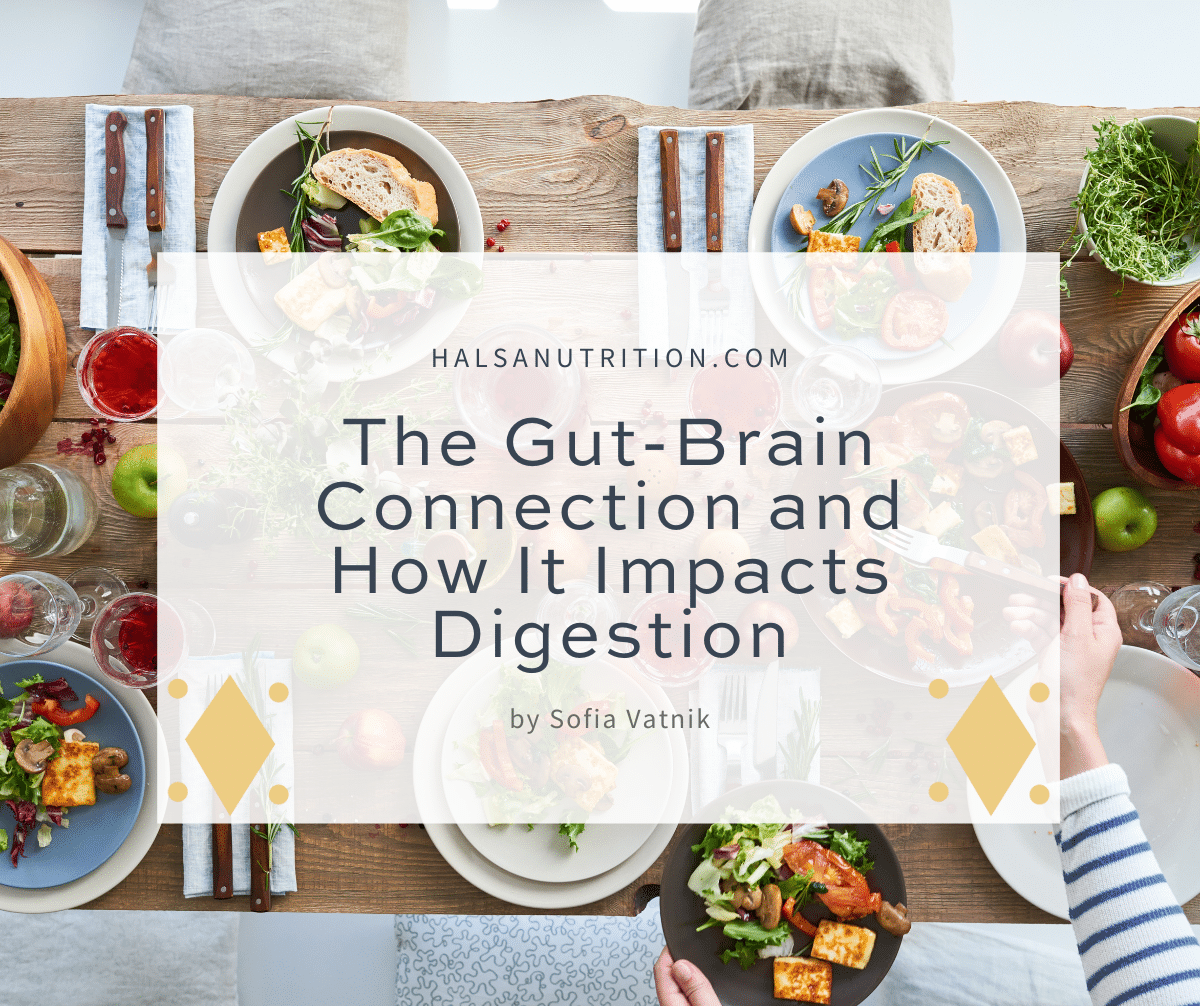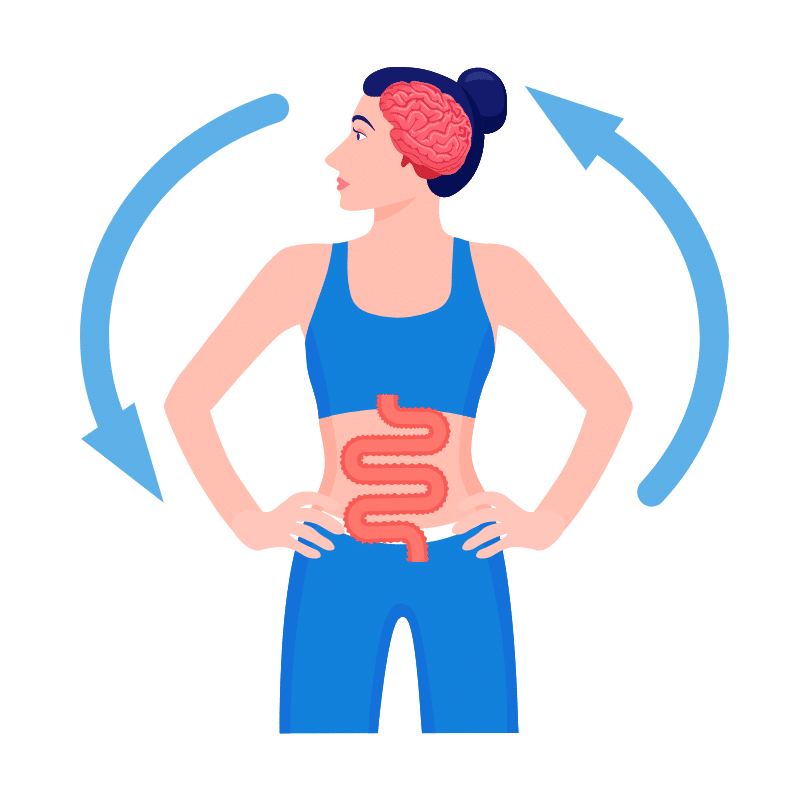
The Gut-Brain Connection and How It Impacts Digestion
Estimated reading time: 6 minutes
Have you ever noticed how your stomach feels when you are anxious or stressed? Our nervous system, which relays information between our brain and the rest of our bodies, plays an important role in our digestion. The way we feel and how well our nervous system is regulated greatly impacts how we eat and how our body digests and absorbs nutrients. This is often referred to as the gut-brain connection.
Let’s learn more about how these two systems work together and what we can do to regulate our nervous systems to increase nutrient absorption.
How does the gut-brain connection work?
The nervous system connects our gut and brain. It is divided into two main parts: the central and peripheral nervous systems.
- The central nervous system includes our brain and spinal cord.
- The peripheral nervous system contains sensory and motor neurons as well as autonomic and somatic neurons that stem from our motor neurons.
The autonomic nervous system that stems from the motor neurons in the peripheral nervous system also regulates the parasympathetic/ sympathetic response. The parasympathetic system is often called the “rest and digest” mode, while the sympathetic system is called the “fight or flight” mode.

The parasympathetic response
(The “rest and digest mode”)
The digestive system plays a key role in the parasympathetic response. As part of the gut-brain connection, it sends signals for glands to release secretions, produce enzymes, and make bile. This system also constricts the airways when resting, as you don’t need a surplus of oxygen. In addition, it increases urinary output when no conservation needs to occur, and it slows down the heart rate, making you feel calm.
The sympathetic response
(The “fight or flight mode”)
The sympathetic nervous system is quite the opposite. It’s activated when your body prepares for a stressful situation, such as being chased by a bear, or a more common modern-day stressor, such as realizing you skipped a work call or are running late to an important event. The sympathetic nervous system releases adrenaline in the form of epinephrine and norepinephrine.
When the sympathetic nervous system is activated, your heart rate increases and glucose increases as it is broken down from glycogen stores. You’ll also notice that your pupils will dilate so that if a bear was chasing you, you could see your surroundings. The bronchial tubules will dilate, allowing more oxygen in, and the digestive system secretions decrease since this isn’t the time to spend energy on digestion.
Hunger and the sympathetic response
Because the sympathetic system impacts the gut, some people may feel less hungry when stressed or anxious. This means that food may not be as well digested. During this time, the body will focus on giving nutrients to the vital organs, such as the brain. Typically, people lose their appetite in response to short-term stress.
When stress becomes long-term and does not resolve, a common response to this stress or anxiety is stress eating. Stress eating, especially comfort foods, makes our bodies feel relaxed and happy by releasing serotonin. Our bodies want to stress eat because when we experience long-term stress, our bodies produce cortisol, which can increase our appetite. This hormone tries to stop non-essential functions from occurring in a way that protects our bodies during fight or flight. High cortisol levels can suppress the functions of the digestive, immune, and reproductive systems. It is important to be aware of the implications of stress eating to create a healthy and loving relationship with our bodies and food. We can lower our cortisol by meditation, joyful movement, and social support such as seeing a therapist or registered dietitian.

How do sympathetic and parasympathetic systems affect digestion?
- When the parasympathetic system is dominant, the body can relax. It slows the heart rate and increases digestion. Thus, when we are calmer, our food is broken down more easily, and nutrient absorption increases.
- During sympathetic activation, digestion is slowed because less blood is supplied to the digestive system. This can result in either constipation or diarrhea, as well as other IBS symptoms.
How do I activate the parasympathetic system for improved digestion?
Mindfulness practices are great tools to use to activate the parasympathetic (aka rest and digest) system. Here are some ways to incorporate more mindfulness into your day:
- Take a deep breath before eating your meal
- Take a moment of gratitude for your space, the food in front of you, and the amazing body you have that keeps you operating every day
- Meditate. Take a few minutes to listen to a guided meditation in the morning, evening, or any time you feel tense
- Allow yourself to find joy in food. Food is fuel, and it is important not to judge yourself and to treat yourself with kindness.

Takeaways:
- Understanding the gut-brain connection can help us become more in tune with our bodies
- Our bodies function optimally and digest food best when we are calm
- Feeling calm is a practice, and tools such as meditation, therapy, and joyful movement can help
- Long-term stress can elevate our cortisol levels, leading to stress eating
Other posts you might like:
- The Science of Hunger Hormones and Appetite
- 7 Key Concepts of Mindful Eating
- From Stress Eating to Comfort Food: Understanding Emotional Eating
- Meal Satisfaction: 12 Ways to Increase It
References:
https://www.hopkinsmedicine.org/health/wellness-and-prevention/the-brain-gut-connection
https://www.nagwa.com/en/explainers/605129689684
https://www.health.harvard.edu/staying-healthy/why-stress-causes-people-to-overeat
About the author:
Sofia Vatnik is a rising junior, nutrition major, and mindfulness minor at Syracuse University on the path to becoming a registered dietitian. Her interests and passions lie in helping people find joy in food while steering away from diet culture.
This article was edited and reviewed by Maria Adams, MS, MPH, RDN, LDN, a registered dietitian and Certified Intuitive Eating Counselor. Maria takes a weight-inclusive approach and helps individuals rediscover the joy of food, eat to feel their best, and heal from chronic dieting and disordered eating. She holds a Bachelor of Science Degree in Nutrition Science, a Master of Science in Nutrition Communication, and a Master of Public Health.
Leave a Reply